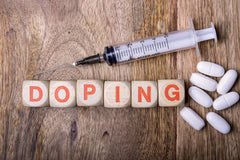Doping in Rugby

When Nicola Sapstead, the chief executive of UK Anti-Doping was asked at a hearing last September which sports she considered the most at risk of doping, her answer was not athletics as many would have expected, but Rugby Union.
A look at the UKAD's sanction list reveals that out of the 47 people listed on the banned list, 16 are from Rugby Union and 12 from Rugby League, comprising 81 per cent of the bans announced in 2015 by the UKAD, the national organisation dedicated to protecting a culture of clean sport.
Why is doping so common in rugby?
Much of the problem lies with the supplement culture in rugby, most of which is perfectly legitimate, but there are also a great deal of banned supplements doing the circuit in both amateur and elite rugby.
Ben Murphy, a 19 year old second row for Merthyr in the Swalec Championship recently received a ban after being sold a supplement called 'Dedicated Unstoppable' by a team-mate. The manufacturer's website described the substance as "banned-ingredient free" meaning Murray felt safe to use it. However, the product was not what it appeared to be and Murray tested positive for dimethylbutylamine costing him a six-month ban.
Many rugby players are turning to the internet in order to seek supplements to boost performance. Particularly those who are on the cusp of breaking through and are attracted to the short cuts that drug enhancements can achieve in order to get to the top.
Tom Rees, a member of the Rugby Football Union’s anti-doping panel, said;
“It is a game that you cannot take the physical element out of, and supplements can be seen as a way of bridging that."
How to control doping
Doping control plays an essential part in protecting the game of Rugby. World Rugby operates a zero tolerance policy to doping and therefore players are expected to be solely responsible for any prohibited substances found to be present in their bodies. Even if players fail to realise that the drugs they are taking are illegal, it will not be enough to stop an order for anti-doping rule violation to be established - known as the 'strict liability' principle.
Which drugs are prohibited?
The Prohibited List is updated annually by the World Anti Doping Agency (WADA) and defines what substances and methods are prohibited in and out of competition. The current Prohibited List can be downloaded from World Rugby’s anti-doping web site at: worldrugby.org/keeprugbyclean
Medications and dietary supplements
Any rugby players taking medication, either prescribed or otherwise, or a dietary supplement of any kind should make absolutely certain it does not contain a prohibited substance. For products purchased in Canada, the UK or the USA, you can check the ingredients of substances by visiting the Global Drug Reference Online at www.globaldro.com. Always advise your doctor or pharmacist before you are prescribed a medication that you may be subject to drug testing.
The doping control process explained
- If ever selected for a doping test, players should be fully aware of what the test entails. Below, centurion provides a step by step guide:
- A players will be asked to produce a urine sample, a blood sample or both. They will be supervised whilst taking the sample to ensure there is no tampering.
- The sample is poured into two bottles, sealed and sent off to the lab for testing.
- The player has to declare any medication that he or she is taking at the time the sample is taken.
- If illegal drugs are found in a player's system, regardless of how they got there, the player will be solely responsible.
- Players can be tested anytime and anywhere, even if they are not in the country at the time, so it's important to always update your whereabouts. A Doping Control Officer can turn up unannounced and you cannot refuse a test.
- If players are taking medication due to injury, they must obtain a TUE, which is an exemption that allows an athlete to use, for therapeutic purposes only, an otherwise prohibited substance or method (of administering a substance).


